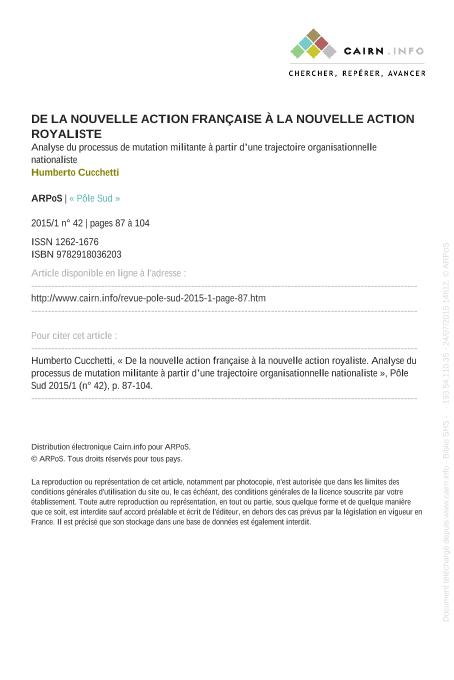Artículo
The transformations that have occurred in the phenomenon of activism have merited several studies and explanations. The present work proposes to address these problems by considering a very specific case: the Nouvelle Action française, founded in 1971, which became the Nouvelle Action royaliste in 1978. The choice of this double scale, at the level of the selected empirical object as well as at the level of temporal delimitation, makes it possible to consider the events, issues and difficulties that lead a nationalist organization to change how it operates and its spaces of activism. In this way, the study of an activist compromise in a concrete case enables a political analysis which is not based on its ideological variables but on a whole set of practices, difficulties and conflicts present in the activist life of an organization. So there is an articulation between the generational maturing of the actors involved in a radical activism and a broader context where the political radicalization finds increasing limits. If the passage from a radical activism to association networks could constitute a simplistic formula that summarizes the process, the mutation of activism becomes a phenomenon that merits an investigation according to the peculiarities of every case analyzed. Les transformations qui se sont produites au sein du militantisme ont fait l’objet d’une diversité d’analyses et d’explications. Cette problématique est ici abordée à partir de l’analyse d’un cas concret : celui de la Nouvelle Action française, fondée en 1971, devenue en 1978 la Nouvelle Action royaliste. Le choix d’une échelle d’analyse réduite tant du point de vue de l’objet empirique que de son développement temporel, donne accès aux évènements, aux enjeux et aux difficultés qui poussent une organisation nationaliste à modifier les dispositifs et les espaces de la pratique militante. L’analyse d’un cas concret d’engagement militant permet d’analyser le politique non pas tant à partir de ses variables idéologiques que sur la base d’un ensemble de pratiques, d’obstacles et de conflits qui traversent la vie militante d’une organisation. On se situe au point d’articulation entre, d’une part, un processus de maturation générationnelle des acteurs du militantisme radical qui, d’autre part, se déroule dans un contexte général qui tend à limiter de plus en plus les phénomènes de radicalisation politique. Si le passage du militantisme radical vers les réseaux associatifs peut illustrer de manière simpliste ce processus de transformation, la mutation des tissus militants constitue un phénomène devant être analysé en fonction des spécificités de chaque objet.
De la Nouvelle Action française à la Nouvelle Action royaliste: Analyse du processus de mutation militante à partir d’une trajectoire organisationnelle nationaliste
Título:
From French New Action to Royalist New Action Analysis of the Process Whereby Activism Mutates from a Nationalist Organizational Course
Fecha de publicación:
08/2015
Editorial:
ARPoS
Revista:
Pôle Sud Revue de science politique de l'Europe méridionale
ISSN:
1262-1676
Idioma:
Frances
Tipo de recurso:
Artículo publicado
Clasificación temática:
Resumen
Archivos asociados
Licencia
Identificadores
Colecciones
Articulos(CEIL)
Articulos de CENTRO DE ESTUDIOS E INVESTIGACIONES LABORALES
Articulos de CENTRO DE ESTUDIOS E INVESTIGACIONES LABORALES
Citación
Cucchetti, Humberto Horacio; De la Nouvelle Action française à la Nouvelle Action royaliste: Analyse du processus de mutation militante à partir d’une trajectoire organisationnelle nationaliste; ARPoS; Pôle Sud Revue de science politique de l'Europe méridionale; 1; 42; 8-2015; 89-104
Compartir
Items relacionados
Mostrando titulos relacionados por título, autor y tema.
-
Ibarra, Romina Alejandra ; Amoruso, Lucía (Universidad Nacional de Córdoba. Facultad de Psicología, 2011-04)
-
Mazaira, Gisela Ileana ; Lagadari, Mariana ; Erlejman, Alejandra Giselle ; Galigniana, Mario Daniel (AgiAL Publishing Group, 2014-11-30)
-
Ferreyra, Alejandra Noemi (Universidad Nacional de Rosario. Facultad de Humanidades y Artes. Escuela de Arte, 2016-08)




